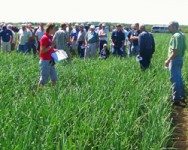Event Details
Date
June 16, 2016
Time
5:00 PM - 7:00 PM
Location
John Dunsmoor Farm
777 1/2 County Route 53
Oswego, NY 13126
Host
CCE Oswego CountyJJ Schell
315-963-7286
email JJ Schell
Oswego County Onion Growers Twilight Meeting
June 16, 2016
This on-farm meeting will provide crucial, in season research to aid onion growers with their management decisions to keep them profitable. The twilight meeting will emphasize strategies to prevent economic loss from onion pests and weeds. All are welcome to attend. 2.0 DEC recertification credits in categories 1a, 10, and 23 will be available.
Agenda:
5:00 PM - "Highlights from 2015 Oswego County onion herbicide trials" Christy Hoepting, Cornell Vegetable Program Specialist, will discuss her results from her 2015 herbicide trials and what growers should know to help prevent weed problems. Jonathan Schell, Extension Agriculture Team Coordinator CCE Oswego County, will showcase preliminary results from post emergent herbicide applications in his 2016 herbicide trial.
6:00 PM - "Controlling Onion Insects" Dr. Brian Nault, Associate Professor Department of Entomology Cornell University New York State Agricultural Experiment Station & Ashley Leach, Graduate Student, Department of Entomology Cornell University will update growers on some of their latest research on onion insects and the pesticides available to control them.
Cost: $10 includes dinner. Pre-registration is required. Return the registration form (below) or call 315-963-7286 by Wednesday, June 15, 2016.
Presented by Cornell Cooperative Extension of Oswego County with generous support from: Seedway, Crop Production Service, Stokes Seeds, Syngenta Crop Protection, Bejo Seed, Hazera Seeds, Bayer Crop Science, and Helena Chemical.
Oswego Onion Meeting Registration Form (PDF; 182KB)



































